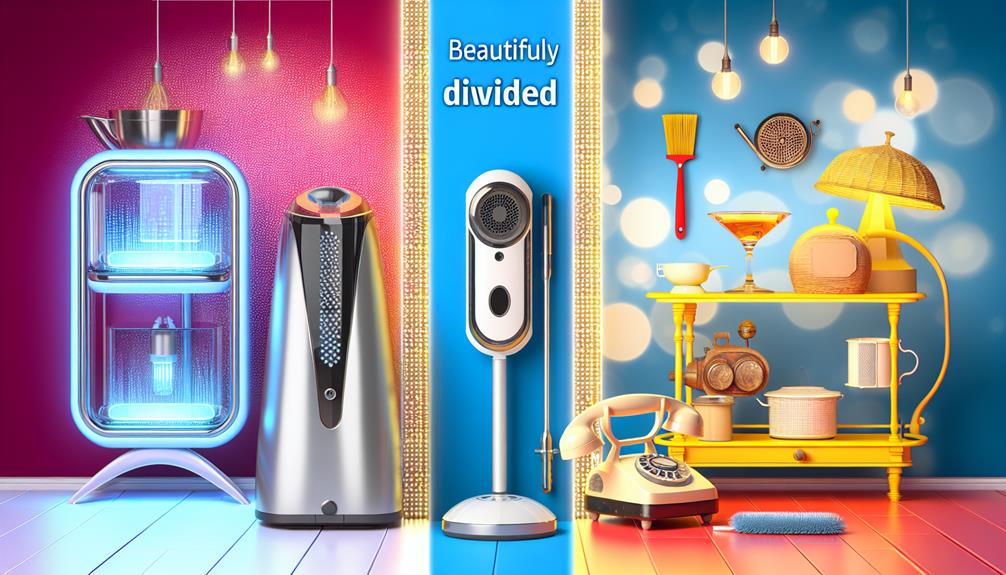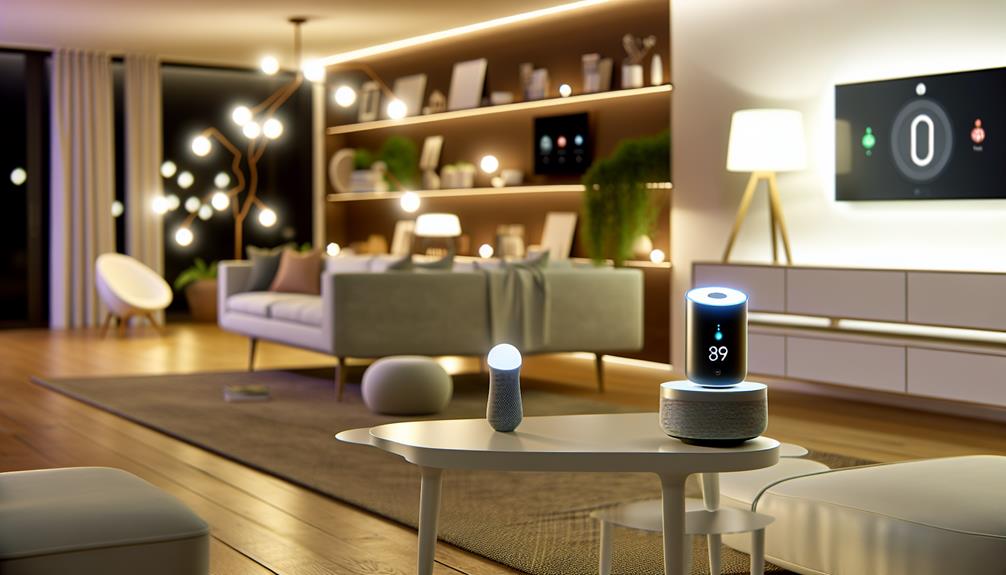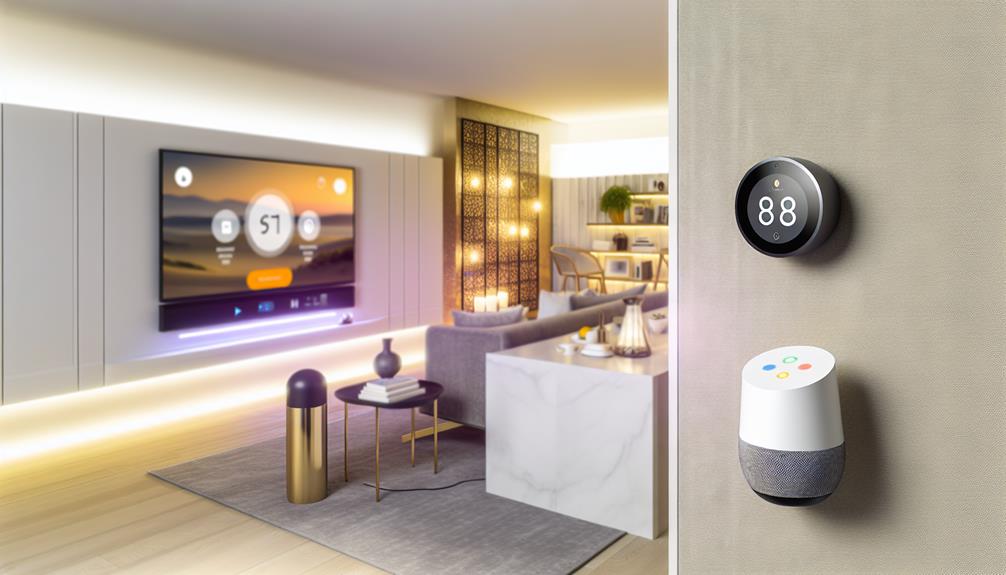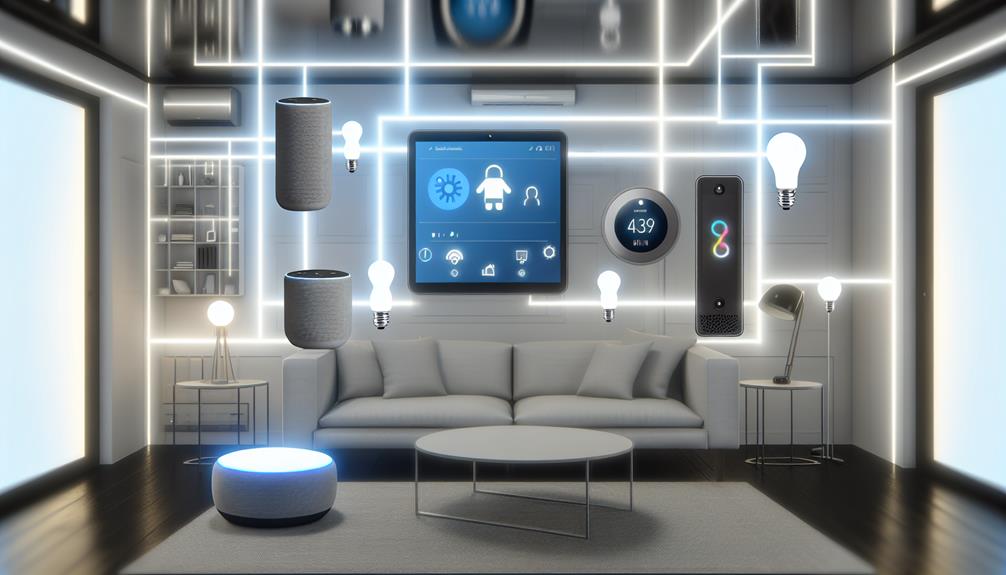Revolutionary Gadgets Vs Traditional Home Devices
The ongoing debate between revolutionary gadgets and traditional home devices raises critical questions about functionality, cost-effectiveness, and user experience. While smart appliances promise convenience through automation and connectivity, traditional devices emphasize reliability and simplicity. This juxtaposition not only affects immediate purchasing decisions but also influences long-term satisfaction and efficiency. As the landscape of home technology evolves, understanding the implications of these choices may reveal unexpected benefits or drawbacks that could greatly impact modern living. What factors ultimately determine the best fit for today's households remains an open inquiry.
Key takeaways
- Revolutionary gadgets offer advanced features like remote control and automation, enhancing convenience and user experience compared to traditional devices.
- Smart appliances promote energy efficiency, potentially lowering utility bills, while traditional devices focus primarily on basic functionality.
- The initial investment in smart technology is higher, but long-term savings and increased home value can offset these costs.
- AI integration in smart devices enhances security through real-time monitoring and alerts, providing greater peace of mind than traditional appliances.
- Future trends emphasize sustainability and user privacy in smart home technology, setting it apart from conventional devices.
The Rise of AI Gadgets
The emergence of artificial intelligence (AI) gadgets marks a significant transformation in the landscape of home technology, redefining how we interact with our living environments. AI assistants, such as Amazon's Alexa and Google Assistant, are at the forefront of this revolution, offering users seamless voice control over various smart appliances. This integration not only enhances convenience but fosters a sense of belonging as families engage with technology that responds intuitively to their needs.
Smart appliances have become essential components of modern households, enabling tasks like cooking, cleaning, and energy management to be executed with unprecedented efficiency. These devices not only save time but also promote sustainability by optimizing resource usage.
In addition, the evolution of home security systems incorporates AI capabilities to provide real-time monitoring and alerts, ensuring the safety of loved ones and possessions. As these technologies continue to evolve, they encourage a more interconnected lifestyle, where individuals feel empowered and secure in their environments.
Ultimately, the rise of AI gadgets signifies a shift toward a more intelligent, responsive home, fostering a deeper connection between technology and the people it serves.
Comparing Smart Devices and Traditionals
Smart devices and traditional home appliances represent two distinct paradigms in domestic technology, each with its own set of advantages and limitations. The choice between them often hinges on user experience and the desire for seamless smart home integration.
- Functionality: Smart devices offer advanced features, such as remote control and automation, enhancing convenience. In contrast, traditional appliances focus on straightforward functionality without the complexities of connectivity.
- Energy Efficiency: Many smart devices are designed with energy conservation in mind, contributing to reduced utility bills. Traditional appliances, while reliable, may lack these efficiency measures.
- Cost: Initial investment in smart technology can be significant, though long-term savings may offset this. Traditional appliances typically have lower upfront costs, appealing to budget-conscious consumers.
- User Engagement: Smart devices often provide personalized experiences through apps and voice commands, fostering a sense of connection.
Traditional devices, while dependable, may lack the interactive elements that modern users increasingly expect.
Benefits of AI Home Automation
AI home automation represents a significant evolution in the way technology enhances daily living, building upon the foundation laid by both smart devices and traditional appliances.
By integrating artificial intelligence into home systems, homeowners can experience substantial benefits that resonate with their desire for comfort, security, and efficiency.
One of the most compelling advantages of AI home automation is energy efficiency. Intelligent systems can analyze usage patterns and optimize energy consumption, leading to lower utility bills and a reduced carbon footprint.
This not only promotes sustainability but also fosters a sense of community responsibility.
User convenience is another key benefit. With AI, homeowners can control various devices remotely, offering unparalleled flexibility in managing their environment.
Whether adjusting the thermostat or turning off lights, convenience is just a voice command or app touch away.
Security enhancement is also paramount. AI systems can monitor homes in real-time, detecting unusual activities and alerting homeowners promptly.
This proactive approach cultivates peace of mind, allowing families to feel secure in their living spaces.
Cost Analysis: Smart vs. Traditional
When comparing the costs associated with smart home devices and traditional appliances, several factors warrant careful consideration. Ultimately, the choice hinges on an analysis of the initial investment versus potential long-term savings.
- Initial Investment: Smart devices generally require a higher upfront cost compared to traditional appliances, which may deter some consumers initially.
- Energy Efficiency: Smart appliances often boast improved energy efficiency, leading to lower utility bills and contributing to long-term savings.
- Maintenance Costs: While traditional appliances may incur fewer maintenance costs over time, smart devices can require software updates and occasional repairs that add to their overall expense.
- Resale Value: Homes equipped with smart technology frequently have higher resale value, reflecting the growing consumer preference for modern home conveniences.
In addition, the user experience offered by smart devices, including remote access and enhanced functionality, can justify the initial investment for many homeowners.
Consequently, while the immediate costs of smart home technology may be intimidating, the potential for long-term savings and improved quality of life can create compelling reasons to embrace this innovative approach to modern living.
Future Trends in Home Technology
As we look toward the future, the evolution of home technology promises to reshape the way we live, interact, and manage our daily routines. With advancements in smart devices, we can expect a surge in sustainable innovations that prioritize energy efficiency and environmental responsibility. These technologies not only enhance our comfort but also contribute to a more sustainable future, appealing to a collective desire for eco-friendly living.
Moreover, as we embrace these innovations, user privacy remains a critical concern. Home technology must evolve to guarantee that personal data is safeguarded, fostering trust between consumers and manufacturers. Future trends will likely focus on transparent data practices, empowering users with control over their information.
To illustrate these trends, consider the following table:
| Trend | Description |
|---|---|
| Sustainable Innovations | Devices that reduce energy consumption and environmental impact. |
| Enhanced User Privacy | Technologies designed with robust data protection measures. |
| Smart Home Integration | Seamless communication between devices for improved efficiency. |
| AI Personalization | Tailored experiences based on individual preferences and habits. |
In this dynamic landscape, the interplay of sustainability and privacy will define the future of home technology.
Frequently Asked Questions
What Are the Environmental Impacts of Smart Gadgets Versus Traditional Devices?
The environmental impacts of smart gadgets versus traditional devices hinge on energy consumption and waste management. Smart gadgets often enhance efficiency but can contribute to electronic waste, necessitating effective disposal strategies to mitigate their ecological footprint.
How Do Smart Devices Affect Home Security Compared to Traditional Systems?
Smart devices enhance home security through advanced smart surveillance technologies, offering real-time monitoring and alerts. However, concerns regarding user privacy arise, necessitating a careful balance between enhanced protection and the safeguarding of personal information.
Can Traditional Home Devices Still Be Relevant in the Age of AI?
In an era dominated by innovation, traditional home devices evoke a comforting nostalgia factor, offering simplicity and reliability. While usability concerns may arise, their enduring relevance lies in the emotional connection they foster within households.
What Is the Lifespan of Smart Gadgets Compared to Traditional Home Devices?
Smart gadget longevity often varies, typically ranging from three to five years due to rapid technological advancements. In contrast, traditional device durability frequently guarantees a longer lifespan, often exceeding a decade, fostering reliability and familiarity for users.
Are There Specific Demographics That Prefer Traditional Devices Over Smart Gadgets?
Demographic preferences for traditional devices often reflect age preferences, with older individuals favoring familiar technologies. Socioeconomic influences and lifestyle choices considerably affect technology adoption, leading to varied acceptance of smart gadgets across different population segments.



